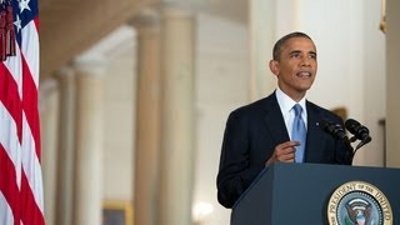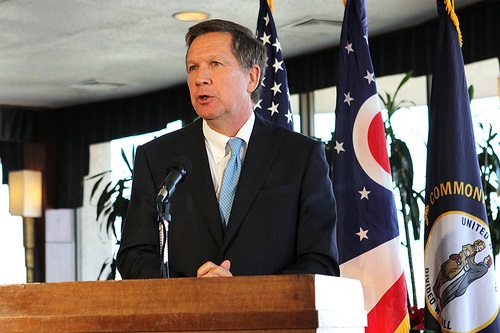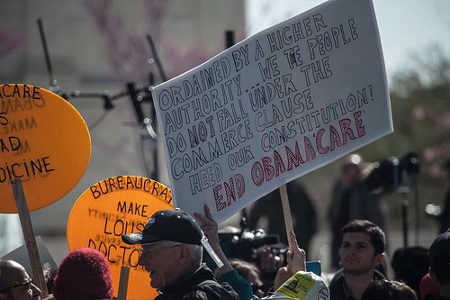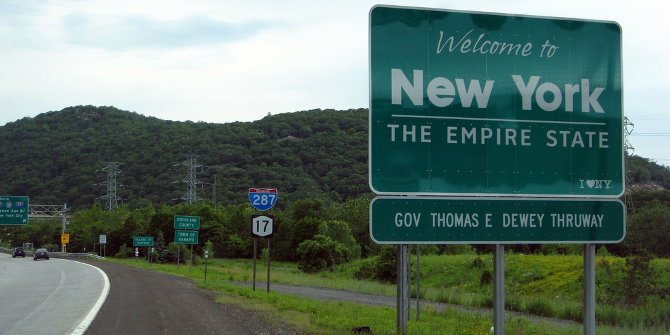USAPP Managing Editor, Chris Gilson looks at the best in political blogging from around the Beltway. Our roundup of state political blogging will follow over the weekend.
Jump to:
[one_half last=”no”]Elections and the road to 2016
The Democrats’ 2016 campaign
The Second Democratic Debate
The Republican Party’s 2016 campaign
Government, the Beltway and Congress’ agenda
[/one_half][one_half last=”yes”]
Foreign policy, defense and trade
Obamacare and health policy
The economy and society
[/one_half]
President Obama, the Democratic Party, and the GOP

This week US political commentary was dominated by reactions to the tragic events in Paris last Friday night, which saw 129 killed in a terrorist attack by ISIS. Many on the right have responded to the attack by calling for Syrian refugees who are coming to the US to be screened to only allow Christians. Post Politics reports that President Obama has called the screening idea ‘shameful’, and recommitted to the White House’s existing strategy of dealing with ISIS. The Daily Signal meanwhile takes Obama to task for what they say is his ‘abandonment of leadership’ in the wake of the Paris attacks. They argue that Obama’s strategy to ‘degrade’ ISIS is a failure, and that it now clearly needs to change.
Moving on to the Democratic Party, The Federalist writes this week on why the party is likely to continue to lose in local and state elections. They say that Republicans are natural community organizers – they tend to be church goers – while with unions in decline, Democrats have few other places to turn to support political coalitions outside of direct activism. In the same vein, The Fix reports on the Democrats’ just released report into their 2014 mid-term election drubbing. They comment that in the entire 18 page report, only one sentence matters – “Of the 7,383 members of state legislatures across the country, Democrats hold 3,172 seats.”
Turning to the Republican Party, Wonkblog writes Tuesday on how GOP state governors could make life miserable for Syrian refugees, after several stated that the do not want such refugees to settle in their state following the Paris terrorist attacks. While governors cannot forcibly stop refugees from coming to their states, they can withhold funding for refugee education and training programs as well as terminating their health insurance. The Fix says that while we may not like the GOP’s calls to ban refugees, it’s smart politics given Republican voters’ concerns about the rise of Islamic extremism in the US.
Elections and the road to 2016
On Sunday, Red State responds to the Paris attacks by stating that the election is now a national security election, with terrorism and the border debate likely to show the two parties’ contrasts with one another. Monkey Cage wonders– given that every new US president faces a surprise international crisis – should foreign policy experience matter in the primaries? They say that the foreign policy inexperience of the GOP’s poll frontrunners, billionaire Donald Trump and retired neurosurgeon, Dr. Ben Carson has not mattered – until now. On Thursday, Monkey Cage examines how terrorist attacks can change opinions and elections, including the 2016 election.
FiveThirtyEight continues its look at what the big issues of the 2016 campaign are, and where the candidates stand on them. This week they turn to the economy, writing that it offers risks and opportunities for all of the candidates. While the economy has improved under President Obama, Democrats don’t seem eager to embrace his legacy because of the rise in inequality. The GOP, on the other hand face concerns that middle class incomes stagnated under the last two Republican presidencies.
The Democrats’ 2016 campaign

On Thursday, The Atlantic says that the Democrats’ 2016 field has a dilemma over what to do about ISIS. Neither of the two frontrunners, former Secretary of State Hillary Clinton and Vermont Senator Bernie Sanders, has a great deal of choice over whether or not to address ISIS, and each face their own challenge on the issue. Sanders is trying to tilt questions on ISIS towards the economy, while Clinton faces uncomfortable questions about the administration’s handling of the group.
This week, Sabato’s Crystal Ball has an overview of the Democratic field, writing that Clinton is likely to ‘breeze’ to the nomination, barring an indictment or serious health problem. Red State, meanwhile comments that the Democrats’ bench is ‘shallow and aging’ in races for the US Senate, House and governorships; the average GOP candidate is actually about two years younger than the average Democrat.
The Second Democratic debate
Saturday saw the second Democratic primary debate in Des Moines, Iowa between Clinton, Sanders and former Maryland Governor, Martin O’Malley. Outside the Beltway reports that the debate drew only 8.5 million viewers, the lowest of any 2016 debate thus far. Turning to commentary on the debate:
- The candidates fought over whether or not candidates who received money from Wall Street financiers could be trusted to regulate the financial industry (Crooks & Liars)
- It showed just how similar the three candidates are – all seem determined to increase government power (Hit & Run)
- Twitter was not happy after Hillary Clinton invoked 9/11 to answer a question about Wall Street (Post Politics).
- Clinton also said on the night that she ‘came from the 60s’, a long time ago’ (Powerline)
- Were the candidates simply arguing about who would surrender the fastest? (Red State)
- Did anyone really with the debate at all? (The Atlantic).

Hillary Clinton
Turning to the former Secretary of State more specifically:
- Clinton was this week endorsed by the 2 million strong Service Employees International Union (PoliticusUSA)
- Thursday saw Clinton deliver a ‘fierce’ foreign policy speech, where she called for the US to lead an ‘urgent war’ against ISIS (Hit & Run).
- Ahead of the debate on Saturday, Clinton had regained the favor of Democrats (The Atlantic)
Bernie Sanders
- Representatives of the Vermont Senator were apparently very unhappy that Saturday’s debate was turned into a foreign policy debate (Powerline)…
- …which could be related to the fact that there has been virtually no online buzz about Sanders and foreign policy in the past month (Post Politics).
- The fact that Sanders is not winning endorsements from unions is a strong indicator that he is not electable (Caffeinated Politics)
- Sanders claims that he is actually more electable than Clinton. The Fix disagrees.
The Republican Party’s 2016 campaign
On Thursday, Sabato’s Crystal Ball has an overview of the Republican primary, reporting that the main changes to its rankings are in their second tier, with former Florida Governor Jeb Bush now falling behind both Senator Marco Rubio (FL) and Ted Cruz (TX). Some have suggested that the highly fragmented GOP field may mean that a brokered convention is needed next July. The Hill’s Congress blog says that this is unlikely as the party would want to avoid the negative publicity which would come out of such an outcome.
Crooks & Liars comments on Saturday that the GOP’s presidential candidates were using the attacks on Paris to ‘angle for war’ against ISIS. Outside the Beltway also has a good overview of the various candidates to the attacks.
Whatever happened to the GOP’s 2008 vice-presidential candidate, Sarah Palin? According to Post Politics, it turns out that she would be willing to run once again.
On Thursday, Monkey Cage writes that despite what many believe, Republican voters are not divided into ‘establishment’ and ‘outsider’ camps. FiveThirtyEight looks at who GOP politicians are endorsing – it turns out that they are supporting the candidates who think like they do. Outside the Beltway examines the battle to define the meaning of ‘conservative’ in the current GOP presidential primary race. Moving on to the candidates themselves:

Donald Trump
- Trump has ‘turned it up to 11’ this week (The Fix)…
- …though his registered voter gap should be of some concern to him (America blog)
- Post Politics has a roundup of nine things that happened during Trump’s recent visit to Worcester, Massachusetts, including going after rivals Ben Carson and Marco Rubio.
- Trump reckons he will be huge with Muslim voters (FreakOutNation)…
- …despite the fact that he would be ‘okay with’ closing mosques and requiring Muslims to carry special identification (Outside the Beltway).
- Make no mistake, Trump could absolutely be the Republican nominee in 2016 (The Fix).
Ben Carson
- Could the attacks in Paris doom Ben Carson’s presidential bid? (The Fix).
- According to Carson’s own advisors, Carson is completely in the dark when it comes to foreign policy (Hit & Run)
- Turns out he’s not so good at maps, either (Wonkblog).
Jeb Bush
Jeb Bush is one of the only GOP candidates who reckons that the US shouldn’t bar Syrian refugees regardless of their religion (Outside the Beltway).

Rubio, Cruz, Paul, and the rest
- Marco Rubio is the new de facto GOP frontrunner (Red State)
- Texas Senator Ted Cruz has taken President Obama’s criticism of the GOP’s stance on Syrian refugees personally; stating that he wants the president wants him to ‘insult him to his face’ (Daily Kos).
- Cruz also had a great week in Iowa, gaining an important endorsement from Congressman Steve King (R-IA) (Political Animal).
- Do the attacks in Paris effectively end libertarian Senator Rand Paul’s (R-KY) presidential hopes? (Hit & Run).
- Ohio Governor, John Kasich wants to ‘solve’ ISIS by creating a new government agency which would push Judeo-Christian values around the world (America blog)…
- …a plan which is ridiculous because it presumes that terrorism can be completely stamped out, and because it would spark a wholesale reexamination of US foreign policy (Hit & Run).
- Louisiana Governor, Bobby Jindal, suspended his campaign this week (Daily Kos).
- FiveThirtyEight looks at why Jindal’s candidacy failed…
- …while The Fix reckons he should take heart given that he outlasted two other GOP Governors, Rick Perry of Texas, and Scott Walker of Wisconsin.
- Former Hewlett Packard exec, Carly Fiorina apparently can’t stop lying about the Syrian refugee crisis (Crooks & Liars).
Government, the Beltway and Congress’ agenda
On Monday this week, The Daily Signal reports that the US Postal Service has made an $5 billion loss for the recent fiscal year. They say that even worse for the Postal Service is the decline in mail – first class mail is now 40 percent below its 2001 level.
Moving on to Congress, Monkey Cage writes Wednesday that should President Obama want to begin bombing the Islamic State, he should ask Congress first. They say that given that Congress has little desire to debate the use of military force, the 2001 Authorization for the Use of Military Force will have to stand for the time being.
This week also saw the GOP introduce a number of bills to restrict Middle Eastern refugees’ ability to come to the US. Post Politics has a roundup of the bills. On Thursday, Outside the Beltway reports that the House of Representatives passed one of the bills which would implement new screening procedures on refugees from Syria. They say that President Obama has already threatened to veto any such bill, and that it was also unlikely to survive a filibuster in the Senate.

Ahead of the Paris climate summit, 52 US senators this week voted to blog the Environmental Protection Agency new rule to curb carbon emissions from coal-fired power stations. The American Interest says that given that the vote is not veto-proof, the act is symbolic; the Senate is sending a clear message that it would never ratify any kind of binding Global Climate Treaty.
Foreign policy, defense and trade
On Saturday, Hit & Run asks that with 50 ‘American military boots’ soon to be on the ground in Syria to fight ISIS, does President Obama have a plan? Informed Comment reckons that despite the attacks on Paris last Friday, sending thousands of US ground troops to Syria to fight ISIS won’t fix the problem. They say that ISIS will remain formidable until a political settlement ‘takes the steam’ out of the conflict in Syria. The Daily Signal, meanwhile has a roundup of commentary on whether Obama is doing enough to defeat ISIS. The general consensus is that his administration’s current strategy does not go far enough.
The day before the Paris attacks, President Obama stated that ISIS ‘was contained’. White House Dossier reports on comments from Senator Dianne Feinstein (D-CA), who is the vice-chair of the Senate Intelligence Committee, that ISIS is definitely not contained, and that she has never been more concerned.
This week President Obama attended the G20 Summit in Antalya, Turkey. Post Politics has three photos of Obama and Russian President Vladimir Putin’s ‘coffee talk’ on the sidelines of the meetings over the weekend.
Powerline says that Secretary of State John Kerry was in hot water this week over comments he made characterizing the January attacks on the French satirical magazine, Charlie Hebdo as ‘legitmate’ compared to last week’s attacks in Paris.
Obamacare and health policy

On Monday, Townhall comments that given Obamacare’s low enrollment figures – only about half of what the Congressional Budget Office had originally expected – and the expected rise in premiums next year, the program should be ‘put out of its misery’ by Congress. The American Interest, meanwhile, wonders if winter is coming for the Affordable Care Act (ACA) after the country’s largest health insurer, United Health stated that it may withdraw from Obamacare’s health insurance exchanges altogether after suffering major losses under the ACA. They say that there is huge demand for health care, which presents a ‘lethal threat’ for Obamacare’s exchange mechanism. The Hill’s Congress blog this week calls for presidential candidates to pledge to make Obamacare more affordable for the middle-class, stating that the program protects corporate tax breaks and discriminates against middle-class families who buy their own health insurance.
On Wednesday, Wonkblog writes that the country’s maternal mortality rate is a ‘national embarrassment’. According to new data from the World Health Organization, the US ranks near the bottom of wealthy nations in terms of maternal mortality. It is also one of the few countries that has seen a rise in maternal mortality since 1990.
The economy and society
On Wednesday, The Fix reports on the results of a new national poll which finds that 64 percent of Americans want to halt the flow of Syrian refugees to the US, or to accept only Christians. The same poll also found a ten point increase in the percentage of people worried about the Islamic State, and a 7 point spoke in the percentage of people worried about terrorism. This week the mayor of Roanoke, Virginia stated that just as the US interned Japanese nationals during World War II, the US should now be mindful of the threat from ISIS. Wonkblog counsels that before we start invoking the internship of Japanese nationals and Japanese-Americans during the War, we need to remember how dark a period in the nation’s history it actually was.
This week Hit & Run says that police in the US have now killed at least 1,000 people this year, after a man with a replica gun was shot dead in Oakland, California.
Are Hispanics finding a better life in the US? The Atlantic investigates, finding that the children of Hispanic immigrants are often better off than their parents, but that the group as a whole is not doing as well in comparison to other immigrant groups.

On Thursday, Wonkblog looks at why some economists say that 2016 will be America’s best year in a decade. The positivity is mostly based on increasing residential construction, a surge in car and truck sales, and a tightening labor market which appears to be delivering wage increases. The Atlantic says that this prosperity is not being shared equally – 2015 has seen the gender pay gap between men and women stop or even reverse.
Featured image, Donald Trump Credit: Gage Skidmore (Flickr, CC-BY-SA-2.0)
Please read our comments policy before commenting.
Note: This article gives the views of the author, and not the position of USAPP– American Politics and Policy, nor of the London School of Economics.
Shortened URL for this post: http://bit.ly/1NgVTep






